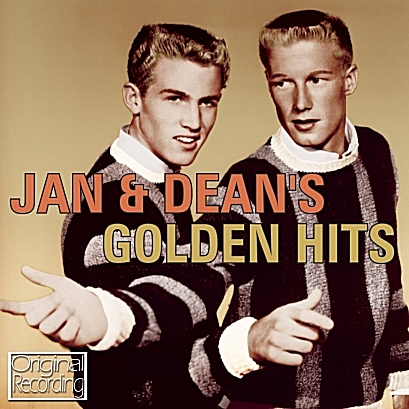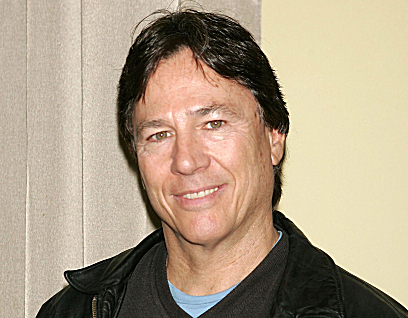How Jan Berry kind of saved my life

by Luke Taylor
March 28, 2016
Jan Berry, part of the 1960s surf-rock duo Jan and Dean, was born on April 3, 1941, and died on March 26, 2004. This piece is published between those dates as part of the music history features on Oake & Riley in the Morning.
It's funny how a scene in a film has a way of burning itself into our memories. Because film is the art form that most closely mimics the way our minds store memories, perhaps it's not surprising. Like many people, I can remember scenes and dialogue from a lot of different films, but there's a particular scene in a made-for-TV movie I'm pretty glad stuck with me.
I don't remember too much about the night I saw the film. That's probably because it wasn't anything special, just another night at home when I was growing up; I couldn't have been more than 12 years old. My parents were going to relax and watch some television, and they asked me, "Do you like Jan and Dean?"
As it is for a lot of people, my parents were my first music educators. Having been kids in the 1960s, my mom and dad had a cool collection of LPs and 45s, with albums and singles by the Beatles, the Beach Boys, the Dave Clark Five, Bob Dylan, the Everly Brothers, Simon & Garfunkel and many others. So when I told them I'd never heard of Jan and Dean, my parents informed me that the duo sounded a lot like the Beach Boys, and there was a movie on TV about them.

During the movie's pivotal accident scene, the car Jan is driving is about to rear-end a one-ton pickup loaded with building materials; a split second before the moment of impact, Jan (as portrayed by Hatch) ducks down across the front seat of the car. It was kind of a scary scene, and it tattooed itself on my brain … although I didn't know it yet.
Fast-forward a few years later: I'm 17 years old, and my parents had relocated from Chicago to an outer-ring suburb in the Twin Cities area. I had a summer job doing maintenance at the community ice arena: sweeping, painting, stripping and waxing floors, and other upkeep and janitorial work. Most of the time, I worked the day shift; occasionally, I'd have to work the second shift, which wrapped up around 1 a.m. Either way, it was a decent job and I worked with some nice folks.
Most of the time, my father would drop me off on his way to work. If I had to work the second shift, I'd had my driver's license for a few months, so my parents let me drive their Toyota Corolla station wagon to and from my job.
One night in July, there was a figure skating meet, and I worked the second shift, meaning most of my time was spent sweeping up popcorn, cleaning rest rooms and emptying garbage bins. Work wrapped up around 1 a.m. as normal; I said goodnight to my manager and stepped out into the mild, calm summer night, under a clear sky and a bright moon.
The trip home was four miles, and given the nature of exurbs, much of it was on highway. There were actually a few different routes I could take, all of them about the same distance. At random, I chose the route that took me on stretch of a two-lane Minnesota state highway.
Turning into the highway, I had the radio on softly. The Corolla had a manual transmission, and I hadn't been driving for very long, so I liked to hear the engine wind up and down as I changed gears, accelerating to 50 mph. I was the only car on the road, but far ahead, as the two-lane highway curved gracefully up a hill, I saw a set of headlights.
Continuing up the hill, the headlights from the opposing vehicle drew nearer. And then I realized something wasn't right: Those headlights were drifting into my lane. My pulse quickened as I turned the wheel toward the shoulder, but the headlights seemed to follow my movements. Recalling the lessons in driver-education classes at school, I remembered learning drunk drivers are often drawn to other headlights. I pulled harder on the steering wheel, but it wasn't enough. Those lights followed, bearing down on me.
It's odd how time seems to distort in certain instances; in sports, for example, critical moments seem to slow down as they are happening. Such was the case on this night, with those lights coming at me: time seemed to slow down. Looking at the opposing lights and — briefly — the silhouette of a pickup truck, I could see there was no way I could avoid a collision. And in that instant, I recalled Richard Hatch in the film Dead Man's Curve — with a crash imminent, I ducked down across the front seat. And then I waited. The moment before impact seemed to hang in time.
But then it happened.
The sound was an explosive roar of steel and glass. It's a horrifying noise. Shattered glass rained down on me. And then the spinning began: I could feel the car spinning, spinning, spinning — for a moment I thought another car might approach and strike me again — but soon, I felt the front end of the car dip down an embankment. I could hear and sense it trundling through tall grass before — thump — the car came to an abrupt stop.
I lay there for just a moment. My first thought was "I'm alive." Slowly I sat up, glass cascading from me — I remember it was even falling out of my ear. Straight ahead, I saw one of my headlights illuminating the row of trees that brought my car to a halt.
The engine had stopped running, but the radio was still on. As I sat there — it's funny thinking back — I wiggled my arms and legs and realized I had full movement, full sensation. Other than the sting of cuts on my face and arms and some ringing in my ears, I didn't feel any pain or injuries.
"I'm fine," I said aloud, a bit incredulously.
At first, I sat there and thought I'd stay put until help arrived, but quickly dismissed that idea; I didn't know if anyone would find me (this was before the ubiquity of cell phones). I didn't know if the dry grass might catch fire. Moreover, I suspected I had just been in an accident with a drunk driver, and I knew drunk people can be unpredictable. I didn't want to be sitting in a car in a ditch if an angry drunk approached, blaming me for what happened. And on a lighter note, I started to wonder what animals might live in the ditch where the car now rested.
So I undid my safety belt, and with the driver's door pushed in and inoperable, I crawled across broken glass to open the passenger door, stepping out into the tall grass where I saw my car had come to a stop just outside a cemetery. I wandered through the tall grass and back up to the road.
As I approached the highway, I braced for what I might find: the other vehicle, the other driver — possibly irate (would I have to fight or flee?), maybe injured, maybe dead. When I got up to the road, it was littered with debris, including three tires I later would learn had been mine.
I looked up and down the road and didn't see another car, so I wandered down the road a bit, looking on both sides of the highway. There was no vehicle and nobody to be found. I was completely alone on that stretch of semi-rural highway.
Soon I saw another set of headlights coming over the hill. As it approached, I waved my hands in the air to signal for help. I was wearing a white Chicago Cubs t-shirt and thought I was pretty visible. Instead of stopping, however, the driver slowed and weaved around the debris in the road; I caught a glimpse of the passenger's face, aghast as she looked back at me. It was then I realized nobody would want to stop to pick me up. Would I pick me up right now? It also occurred to me that getting in a car with a random person might mean a new danger.
I remembered there was a fast-food restaurant about a mile up the road, and there might still be people working there, so I started running up the hill. As I ran, I could feel the air filling my lungs, the peaceful night and the gentle sound of my footfalls standing in contrast to the violence that happened moments earlier.

When I reached the fast-food place, the door was locked, but I could see the lights on and a kid about my age mopping behind the counter. I knocked on the door and waved to him; he looked at me then disappeared for a moment. He reappeared with his manager. "Help me," I said through the window. "I've been in an accident and would like to use your phone."
They let me in and I told the quick version of my story to the manager, who immediately phoned the police. Then I phoned home. My mother, roused from sleep, answered the call. That has to be a call a parent never wants to receive, being informed that his or her child has been in an accident, but it's probably easier hearing the child's voice tell the story. I remember apologizing. "I'm really sorry, but I've been in an accident," I said. "I think the car is destroyed."
My parents woke quickly and my dad headed out to collect me. Meanwhile, I chatted with the others at the fast-food place. They gave me a soft drink. The guy who first saw me out the window looked at the glass bits that covered me. "You're all sparkly," he said, amused. "So … Cubs fan?"
In the following days, I learned that indeed I had been involved in a hit-and-run with a drunk driver. The other driver got some distance from the accident before the front axle on his pickup truck fell apart from the collision. He abandoned his truck and started walking home, but he forgot his wallet on the driver's seat. When he reached his door, police were already waiting for him.
I was told his name, but I never met him or faced him in the criminal court proceedings that followed. The only thing I had to do was give a statement over the phone, describing what happened. Later I learned that it was his fourth offense for driving under the influence; because that may indicate other issues, I certainly hope he received any help he needed. I don't ever recall having any real hard feelings toward him; perhaps any resentment I may have felt was supplanted by gratitude for being OK.
One of my managers at the ice arena wasn't so charitable. "He could've f*****g killed you," he said bluntly.
Yeah, maybe. But if my mom and dad hadn't invited me to watch that movie about Jan and Dean way back when, I may not have guessed how to protect myself.
So in that way, Jan Berry kind of saved my life. Maybe Richard Hatch, too.
But really, it was my parents.
